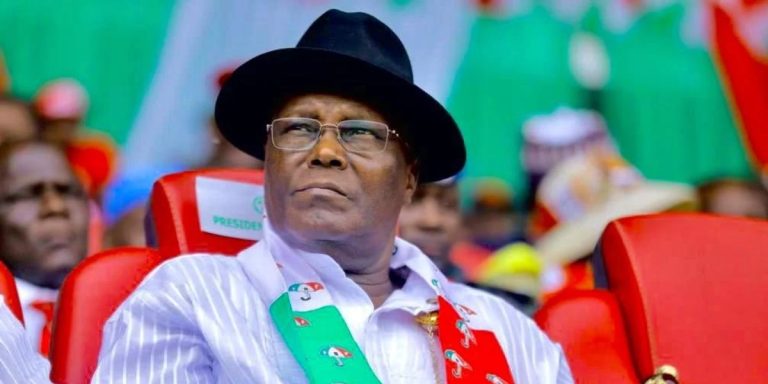Presidency has declared that the political future of former vice president Atiku Abubakar is bleak hours after key opposition politicians defected to the All Progressives Congress (APC).
Atiku, presidential candidate of the Peoples Democratic Party, PDP, in the 2023 election, is currently engaged in putting together a coalition to challenge President Bola Tinubu of the APC in 2025.
Recall that Atiku’s running mate in the 2023 election, Ifeanyi Okowa, a former governor of Delta State, defected to the APC on Wednesday.

Okowa’s defection to APC was made public shortly after a meeting at Delta State Government House in Asaba.
He explained that his decision was not a wrong step, stressing that he was on the right path.

“Be assured that we will not go in the wrong direction. We will take the best direction, the best path for our people,” Okowa said.
Similarly, Governor Sheriff Oborevwori of Delta State also dumped the PDP for the ruling APC.
Oborevwori’s defection was part of the outcome of the meeting with leaders and stakeholders of the PDP in the state.
However, the Presidency through Bayo Onanuga, Tinubu’s Special Adviser on Information and Strategy, reacting to the development in the PDP described Atiku’s political future as bleak in a post on Thursday, also called the PDP chieftain ‘a loser’.
Posting on X, Onanuga wrote: “Atiku’s political future looks bleak.

“The coalition that he, El-Rufai, Babachir, and new member Baba-Ahmed are cobbling together has disintegrated.
“Potential allies, including former running mate Ifeanyi Okowa and defunct CPC members, are giving his leprous group a wide berth. Atiku is a loser again.”
Meanwhile, amid mounting concerns over Nigeria’s political direction, the National Secretary of the APC, Senator Ajibola Basiru, on Wednesday, strongly denied claims that the ruling party was driving the country toward a one-party system.
Speaking on Politics Today, a current affairs programme on Channels Television, Basiru addressed the growing criticism following high-profile defections from the opposition Peoples Democratic Party (PDP) to the APC, including those of Delta State Governor Sheriff Oborevwori, his deputy Monday Onyeme, and former Governor Ifeanyi Okowa.
Basiru was unequivocal in his response to questions about whether the APC was systematically weakening opposition forces through state-backed intimidation.

“How can we turn Nigeria into a one-party state?” he asked. “This country is not our making. The structure of its policies is not our design. The real issue is that the opposition is not taking its responsibilities seriously.”
Rather than accept blame, Basiru shifted focus to what he described as the lethargy of Nigeria’s opposition parties. He challenged both the media and the public to examine the operational strength of other political parties, pointing to the APC’s continued efforts to build a strong grassroots presence across Nigeria.
“Visit the headquarters of other parties tomorrow and see if there is any activity. Meanwhile, we are investing in a functional and efficient structure at every level from wards to local governments and states,” he said.
Drawing from historical context, Basiru reminded Nigerians that the APC, once an opposition party itself, did not crumble under pressure. He recalled how President Bola Ahmed Tinubu, then a lone opposition governor in the Southwest after the 2003 elections, remained steadfast despite numerous investigations and political harassment.
“When we were in opposition, we stayed the course,” Basiru said. “Tinubu was tried by the Code of Conduct Tribunal, and despite all of that, he didn’t abandon the party. We kept expanding.”

He also responded to allegations that the APC uses federal power to coerce opposition members into joining its ranks. Citing Amílcar Cabral’s famous words—“Tell no lie, claim no easy victory”—Basiru accused opposition parties of blaming external forces rather than confronting their own internal weaknesses.
“Fifteen lawmakers from Labour, PDP, NNPP, and SDP have joined the APC in recent months. Some are new members of the National Assembly with no corruption allegations against them. So where is the harassment?” he asked.
Referencing the recent defection of Delta State political heavyweights, Basiru said the development is a sign of the APC’s growing appeal and the opposition’s waning influence in key regions.

“In Agbor two weeks ago, I witnessed the Delta Unity Group, led by the NDDC chairman and joined by the daughter of former Governor James Ibori, officially align with the APC,” he said. “Of course it caused an uproar. Delta is vital to the opposition’s political plans, and they know we’re gaining ground.”
Basiru credited the leadership of President Tinubu and the Progressive Governors’ Forum for the party’s recent momentum, likening the APC’s expansion efforts to grassroots evangelism.
“We’re out there like Jehovah’s Witnesses, pardon the comparison, knocking on doors and sharing the vision of the APC in every corner of Nigeria,” he remarked.




